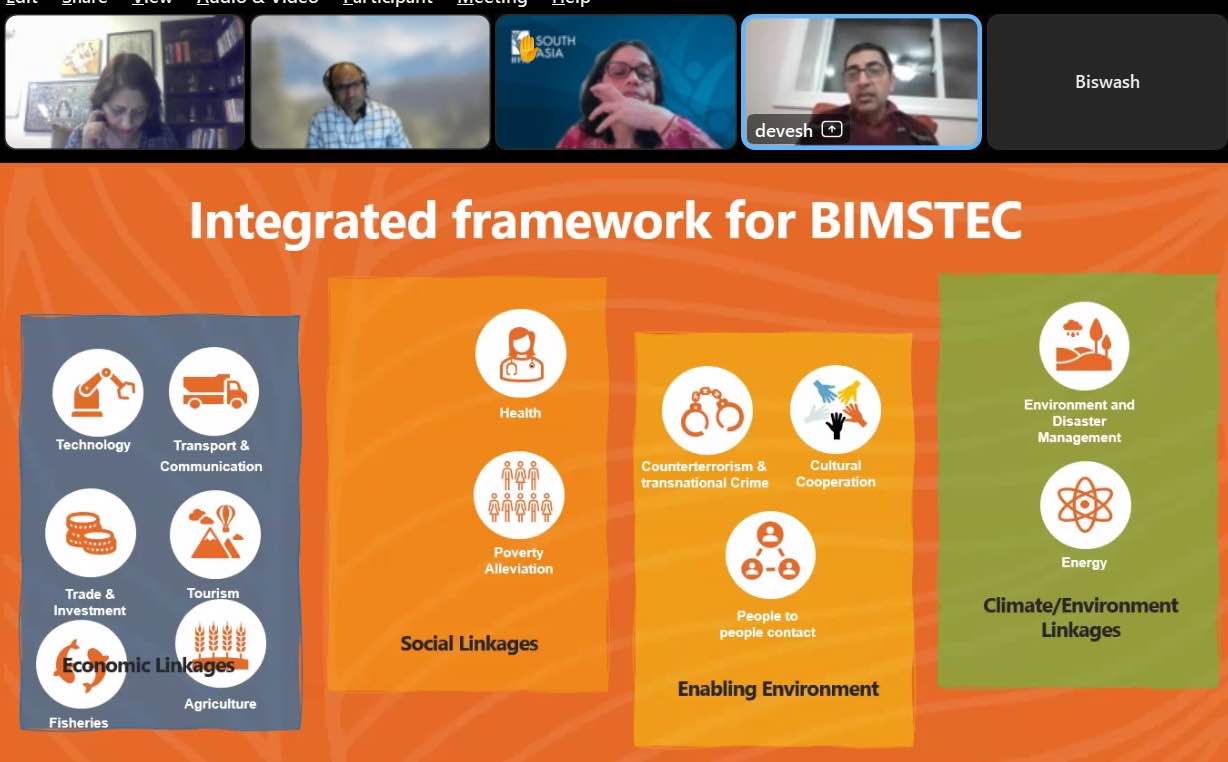The Bay of Bengal Initiative for Multi-Sectoral Technical and Economic Cooperation (BIMSTEC) is an international cooperation organization operating throughout South and Southeast Asia. BIMSTEC has 14 priority areas of cooperation and agriculture, and food security is one of its seven pillars.
In collaboration with IFPRI’s South Asia Regional Office, the Research and Information System for Developing Countries (RIS) organized a virtual meeting of national partners on March 30 to deliberate on collaborative studies, capacity strengthening, and policy communication related to food and agricultural trade in BIMSTEC countries.
The partnership aims to provide meaningful policy insights to BIMSTEC countries for promoting their global and intraregional trade of agricultural products.
“The potential of the agriculture sector has not been fully realized in most BIMSTEC countries. Global trends suggest that although there has been some progress in the agriculture sector in terms of production and trade, there is still unexploited potential. More needs to be done to facilitate trade in order to realize the full potential of the sector and address impediments to trade,” said Priyadarshi Dash, an Associate Professor at RIS.
At the meeting, panelists reflected on key questions to advance the agenda of trade and agricultural transformation in BIMSTEC countries:
- What are the most important issues in the food and agriculture sector for BIMSTEC?
- How can the global and intraregional trade of food and agriculture products from BIMSTEC countries be enhanced, both individually and collectively?
- How can investment in food processing and related infrastructure be prioritized?
- What is the state of tariff and non-tariff policies and how can their burdens be lessened?
- How do we envision the need for trade facilitation, trade financing, broader infrastructure, and cross-border settlements, which will provide impetus to the food and agriculture sector?
- How do we understand and utilize innovations in trade patterns and policies in order to monitor and assess trade?
“Despite trade and investment advantages, the region has poor economic integration due to a lack of connectivity, mobility, and geostrategy,” said Devesh Roy, a Senior Research Fellow at IFPRI. He presented the conceptual framework of the project, emphasizing that trade issues cannot be considered in isolation and that the essence of the framework hinges on economic, social, climatic, and environmental linkages. He further emphasized that all these linkages operate within the confines of an enabling environment and must be viewed in an integrated framework.
“Trade facilitation barriers have affected the export of different products. By reducing inefficiency at the borders, significant gains can be achieved in BIMSTEC countries. The regional body can also play a greater role in promoting peace and sustainable development and strengthening cooperation between South and Southeast Asia,” said Bishwambher Pyakuryal, Chairman of the Institute for Strategic and Socio-Economic Research in Nepal.
“Nepal is landlocked and one of the world’s least developed countries, which presents a tremendous challenge for its economic development and growth. Besides that, the country shares 1,700 kilometers of open and porous border with India, and we have never been able to fully understand the extent of informal trade carried out at the border,” said Biswash Gauchan, Executive Director of the Institute for Integrated Development Studies (IIDS) in Nepal.
He added that a study of informal trade between India and Nepal will establish a different narrative on bilateral trade agreements between the two countries.
Nisha Taneja, of the Indian Council for Research on International Economic (ICRIER) in New Delhi, focused on the structure of BIMSTEC. She noted that BIMSTEC’s sectoral approach is different from most other regional agreements. Although the body has mutually agreed on 14 sectors, the sectors have not progressed at the same pace.
“It would be good to understand what BIMSTEC is considering under the pillar of agriculture. Whatever work we plan should be in sync with the vision of agriculture and if there is no vision, we could develop one for the BIMSTEC secretariat,” Taneja said.
She also noted that when organizations discuss challenges in trade, they tend to focus on non-tariff barriers. However, tariff liberalization has not yet been completed. Although India has decided unilaterally not to impose duties, institutions, research organizations, and think thanks should consider and address the tariff regimes of other countries as well.
Summing up the session, Mamata Pradhan, a Research Coordinator at IFPRI, emphasized that trade facilitation cannot be considered in isolation. She stressed the need to consider trade facilitation through an integrated lens and noted that the project would focus on collaborative research, capacity building, and policy communication.
Rebika Laishram is a Senior Communications Specialist with IFPRI South Asia.
The program on regional trade and agricultural transformation in the Bay of Bengal countries is supported by the Bill & Melinda Gates Foundation.







